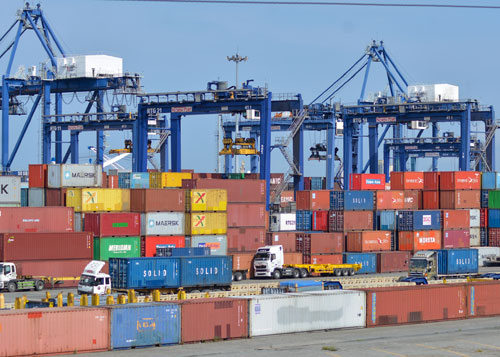The peso weakened anew on Wednesday, closing near to its record low of P59:$1 while share prices post gains on bargain hunting.
The peso closed at 58.965 to the dollar, down from 58.865 on Tuesday. It opened at 58.95, hitting a high of 58.888 and a low of 58.999. Trading turnover reached $505.37 million.
Several Asian currencies reversed course to trade higher versus the dollar in volatile trading ahead of some key data releases in the United States, while South Korea’s won was propped up by an interest rate hike, Reuters reported.
The Singapore dollar and the Thai baht traded about 0.1 percent and 0.2 percent higher, respectively, in the latter half of the day, with the baht also supported by data showing industrial sentiment had strengthened in September.
“I think, right now, the markets are pretty jittery,” said Galvin Chia, an emerging markets strategist at NatWest Markets, adding that risky assets were especially volatile.
The Philippine Stock Exchange index (PSEi) was up 6.26 points, a 0.11 percent hike to 5,853.63.
The broader All Shares index was up 3.14 points or 0.1 percent to 3,155.58. Losers edged gainers 87 to 82 with 55 stocks unchanged. Trading turnover reached P3.7 billion.
Stocks in Asia remained mixed, with markets in Malaysia and Indonesia falling 0.4 percent and 0.2 percent respectively, while those in China and India rose 1.4 percent and 0.7 percent, respectively.
Claire Alviar, analyst at Philstocks Financial Inc., noted that investors were mostly on the sidelines.
“We see a weak conviction from the market as they continue to monitor the peso and the inflation rate in the US,” she said.
Most actively traded BDO Unibank Inc. was up P1.20 to P116. Jollibee Foods Corp. was steady at P233. International Container Terminal Services Inc. was down P3 to P175. Manila Electric was down P0.80 to P289.20. SM Prime Holdings Inc. was up P0.20 to P31.20. Ayala Land Inc. was steady at P22.70. Semirara Mining and Power Corp. was down P0.7 to P39.30. SM Investments Corp. was up P5 to P764. DMCI Holdings Inc. was down P0.14 to P10.06. Monde Nissin Corp. was down P0.02 to P11.70.
The won appreciated 0.7 percent after the Bank of Korea (BOK) raised its benchmark policy rate by 50 basis points (bps).
While the hike was in line with market expectations, two of the BOK’s seven board members had voted for a 25 bps hike.
“This clearly shows that the spectrum of dove-hawk tendencies is shifting slowly from curbing inflation to supporting growth,” said analysts at ING, adding the BoK will likely normalize its hiking pace back to 25 bp in November.
The won has weakened nearly 17 percent against the US dollar so far in 2022, the biggest decliner among major Asian currencies after the Japanese yen, which has lost more than 21 percent.
India’s rupee gained a marginal 0.1 percent with the Reserve Bank of India likely intervening in small volumes since Monday, when the currency hit a record low of 82.6825 to the dollar.
India will also report consumer prices data later on Wednesday. Inflation is expected to have accelerated to a five-month high in September, according to a Reuters poll.
The Chinese yuan remained choppy, with faster-than-expected credit growth in September acting as a positive but offset by a strong dollar and a negative global economic outlook.
Malaysia’s ringgit and traded about 0.2 percent lower.
Investors are awaiting the minutes from the US Federal Reserve’s September meeting, and data on US producer prices. US September consumer inflation data is also due late on Thursday. Headline inflation is expected to have eased slightly, according to a Reuters poll.
The negative market sentiment earlier in the day was also in part due to the Bank of England reiterating it would end support for the bond market on Friday, but it later backtracked on this, according to a Financial Times (FT) report.
The FT reported the BoE signaled privately to lenders it was prepared to extend its emergency bond-buying program beyond Friday’s deadline.
Further souring risk appetite, the International Monetary Fund (IMF) cut its outlook for global GDP growth to 2.7 percent for 2023, down from the 2.9 percent it had forecast in July, due to inflation pressures. – Ruelle Albert Castro, Reuters





